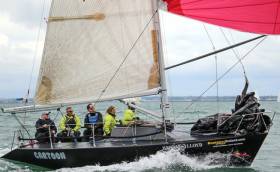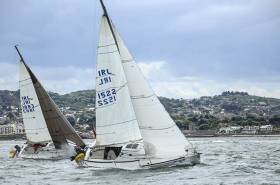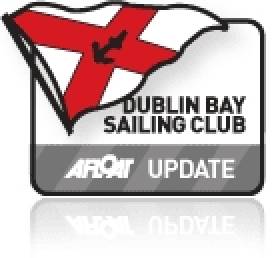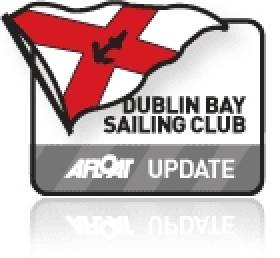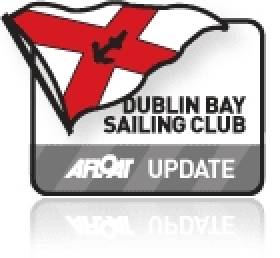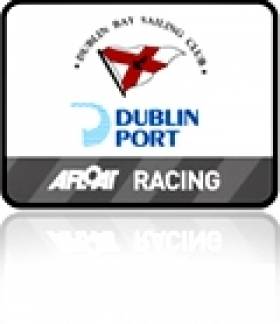Displaying items by tag: Cruiser Challenge
MGM DBSC Cruiser Challenge Results HERE!
Quarter Tonner Cartoon from the Royal Irish Yacht Club was the class three IRC winner of this weekend's MGM Boats sponsored DBSC Cruiser Challenge. In two days of very contrasting weather, the 14 divisions concluded this evening in light winds and bright sunshine. Saturday's racing was dominated by heavy downpours. The all–black quarter–tonner owned by Sybil McCormack and Ken Lawless was four points clear of Asterix from the DMYC. Third was RIYC yacht Barry Cunningham's Quest.
Tim Goodbody's J109 White Mischief was the winner of the biggest fleet in the DBSC Challenge. The Royal Irish sailor was the winner by one point from club mate Colin Byrne in the XP–33 Bon Exemple. The 15–boat IRC one division also featured new J109 entry on the bay, Chimaera, sailed by Royal St. George's Andrew Craig.
Up to five races were sailed in some classes but others sailed only two.
Full results for all classes are downloadable below.
Dublin Bay Sailing Club is targeting a total fleet of 60 boats in eight classes for its Cruiser Challenge regatta sponsored by MGM Boats this weekend. The event will run in association with the Royal St George Yacht Club at Dun Laoghaire.
Classes racing are Cruisers 0, 1, 2 (including Sigma 33s), as well as Cruisers 3, 5 and 31.7s.
Mixed Sportsboats will also compete in the event that will have up to three courses.
The event will incorporate the Beneteau 211 National Championships.
Download DBSC's Notice of Race below. Online entry is open til Friday here
Breezy Start To DBSC Cruiser Challenge on Dublin Bay
Tony Fox's Gringo leads Class one IRC after three races of the Dublin Bay Sailing Club Cruiser Challenge today.
The first day was one of mixed fortunes for many crews with plenty of retirees due to damage, a collision and strong shifty winds.
Full results after day one are downloadable below as a PDF file.
Sunshine & Wind for DBSC Cruiser Challenge Season Finale. Results Here!
#dbsc –The MGM boats sponsored DBSC Cruiser Challenge was held in some of the best condititons of the entire summer sailing season. Cruiser classes Zero, one, two and three were joined by Sigma 33s, Beneteau 31.7s and White Sail fleets to produce a stunning season finale at the Royal Irish YC in Dun Laoghaire yesterday. There were eight protests heard. Full results class by class are downloadable below as word docs. (subject to protest).
DBSC Cruiser Challenge 2013 Day One Results
#dbsc – Dublin Bay Sailing Club's annual Cruiser challenge day one results are published below. Overall results for tomorrow's racing sponsored by MGM Boats will be published on Afloat.ie after racing.
#dbsc – In a week that is a two year high point for Dublin Bay sailing and the staging of Volvo Dun Laoghaire Regatta on Thursday, Dublin Bay Sailing Club (DBSC) has made the timely announcement of its annual DBSC Cruiser Challenge from August 23-25.
Like VDLR it will have IRC handicap fleets but also incorporates the Beneteau 31.7 National Championships and Cruisers 3 East Coast Championships. The event is sponsored by MGM Boats Ltd.
A DBSC notice of race and entry form for the Cruiser Challenge is downloadable below
Dublin Bay Sailing Club's annual Cruiser Challenge for Cruisers 0, 1, 2, Sigma 33 and 31.7’s will be held from 26th-28th August 2011. This year the sailing weekend event is hosted by Dun Laoghaire's National Yacht Club. The notice of race for the event is below:
The Cruiser Challenge 2011
26th-28th August 2011
PROVISONAL NOTICE OF RACE
1. Organising Authority and Rules
The organising authority is Dublin Bay Sailing Club. The event is governed by the Racing Rules of Sailing and any amendments thereto, IRC, the ECHO handicapping system rules, Sigma 33 class rules, the 31.7 Class Rules, this Notice of Race and the sailing instructions. In the event of a conflict the sailing instructions shall prevail.
2. Schedule of Races
Warning Signals
Race 1 26th August 16:55 hrs. Fixed mark course.
Race 2 27th August 10:45 hrs. Windward/Leeward or Trapezoid type course.
Race 3 ASAP after Race 2 Windward/Leeward or Trapezoid type course
Race 4 28th August 10:45 hrs Windward/Leeward or Trapezoid type course
Race 5 ASAP after Race 4 Fixed mark course
Note: Any of the above courses may be substituted for each other or a course as announced on VHF Channel 74.
3. Racing Area
The racing area will be the waters of Dublin Bay and Killiney Bay - Admiralty Chart 1468.
4. Eligibility
Eligible boats are those the classes which comply with the relevant handicapping system, the one design Sigma 33 rules, the 31.7 class rules and the entry requirements.
5. Classes and Handicap Systems
5.1 Boats will race under IRC, ECHO Handicap System, Sigma 33s and 31.7 classes will race one design and under ECHO.
5.2 Cruisers will be divided on the basis of their current ISA Standard ECHO Reference Handicap/ IRC
ECHO Handicap as follows:
Cruisers 0 - Boats at 1.045 to 1.250
Cruisers 1- Boats at 0.980 to 1.044
Cruisers 2- Boats from 0.920 to 0.979
5.3 Boats shall comply with all stipulations and/or conditions relevant to the valid current certificate. (Subject to the right of the organizing authority to allocate a boat to any class.
6. Team Event
A trophy will be presented to the entered team comprised of one boat from each cruiser class, the Sigma33 class and 31.7 class which aggregates the lowest number of points over the series of races under IRC, one design for the Sigma class and 31.7class. Teams should be nominated in writing to the Race Office before commencement of racing. Note: RRS Appendix D (Team Racing Rules) shall not apply.
7. Certificates
ECHO handicaps will be advised to DBSC by the relevant rating authority. A copy of the relevant IRC certificate must accompany the entry form. However, it is the entrant's responsibility to ensure that DBSC have the correct handicap available and therefore late changes should be advised to the Hon. Secretary by the boats concerned.
8. Responsibility
8.1 The safety of a boat and her crew is the sole and inescapable responsibility of the owner(s) or the owner’s representative whose obligation it is to ensure that the boat is fully sound, seaworthy, manned by an experienced crew and equipped with all the necessary safety gear. Neither this Notice of Race or the Sailing Instructions nor any action of the organizing authority in any way limits or reduces the complete and unlimited responsibility of the owner(s) or owner’s representative.
8.2 Attention is drawn to RRS Fundamental Rule 3 “Acceptance of Rules” and Rule 4 “Decision to race”.
8.3 Boat owners and competing crews shall ensure that they are adequately insured against loss, damage or injury to persons, boats or equipment at all times and however occurring and shall maintain third party insurance cover of not less than one million five thousand EURO (€1,500,000), and shall produce a valid certificate of insurance upon request.
8.4 No responsibility shall be accepted by the organizing authority, its members, servants or agents, nor those officials or members connected with the event for any loss, damage, injury or other claim of whatever nature howsoever arising or caused in connection with participation in, or intended participation in this event.
9. Entries
The entry fee for each boat is €80.00 Entries shall be made by completing the details on the boat entry form (overleaf) and forwarding it to the Hon. Secretary, D.P.O'Sullivan, 72, Clonkeen Drive, Foxrock, Dublin 18. (The form may also be downloaded from the DBSC website). An entry is required from all boats intending to compete, including those already racing in a current DBSC series. The latest date for entries is Monday 22nd rd August. Late entries may be accepted at the discretion of the Committee and on payment of late entry fee of €25.00
Helmsmen and their crews competing in the event will be temporary members of DBSC and the National Yacht Club for the days of the event. Owners, Helmsmen and their crews will be bound by the rules of the Clubs. The Clubs reserve the right to withdraw such temporary membership. All entries are accepted at the sole discretion of the Committee.
10. Sailing Instructions (May be available www.dbsc.org during August 2011)
Sailing Instructions may be posted to each entrant, left in entrant’s yacht club or collected from the Race Office before racing. Please indicate on the entry form whether Sailing Instructions are to be posted or to be collected. The Race Office and official notice board will be situated in the National Yacht Club.
11. Berthing
Boats requiring berths on the Marina must register with the Marina Administration Office on Ch. 37A prior to being advised which berth they will be allocated. Overnight berthing is available at normal rates. Berths will be allocated on first come basis. Marina Tel. (01) 2020040./ Fax (01)2020043.
A limited number of berths may be made available at the National Yacht Club. Please contact the boathouse prior to arrival.



























